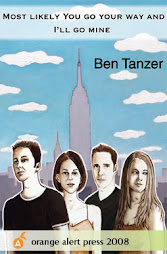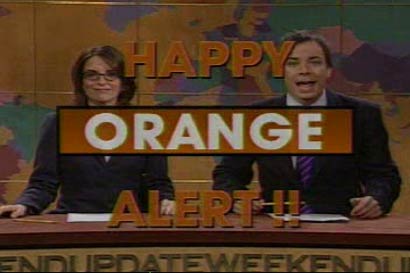
"Twelve ounces of courage / Makes the world look better." - Dag Nasty from Under the Influence (mp3)
For me the element that makes a novel fascinating and irresistible is honesty. For some it maybe fantasy, others my like humor or romance or action, but I want honesty. Not necessarily about the writer's life, but of the characters lives and thoughts. When tragedy occurs or when moments of supposed joy take place what are the characters actually thinking and feeling. Most times the mind does not always focus on what one would logically think it should. For example, when the brilliantly named main character of Ovenman, the debut novel from Jeff Parker, When Thinfinger, is faced with a major injury to his girlfriend what is he thinking. It is not get help, call 911, go to the hospital and sit bedside all night, When thinks of his new job and all of the details involved. It is this honest look into the characters mind the allows the reader to fully understand why he does what he does. In fact, When is the most honest with himself when he has had to much to drink, and writes cryptic, poorly-spelled notes to himself.
Jeff Parker currently lives and teaches in Toronto, Ovenman (Tin House Books) is his debut novel, but short stories have been making appearances in various places for years. He has also put out an interesting illustrated story collection called The Back of the Line by artist William Powhida.
Recently, Jeff was kind enough to answer a few of my questions regarding character names, post-its, and punk rock.
Orange Alert (OA): The main character of Ovenman is named When Thinfinger and his paranoid girlfriend is named Marigold. How much thought went into those names? How important is a memorable name for a lead character in a novel?
Jeff Parker (JP): Names are big for me. Most of the time, I can't even get a handle on a character without pegging the name. I'll go through drafts with the wrong name sometimes, then happen upon a better one and totally reconceive the character based on that new name and end up rewriting the piece. You didn't ask me, but I'll tell you the name of my favorite character in literature: "Akaky Akakievich" from Gogol's "The Overcoat". It might be translated from Russian as "Shitty Shithead".
OA: I really enjoy the use of post-it notes in Ovenman, where did that idea come from?
JP: When uses the Post-its to remind his sober self what his drunk self did the night before, which is usually something memorable, like fuck his best friend's girlfriend, rob his own restaurant, get his dick pierced… But more often than not, they don't work as they're intended because his handwriting and spelling is terrible and the Post-its are so small any message is cryptic. Yet they're something he relies on. I like that kind of disconnect in fiction. Also, what's more signifying of cubicle culture than a Post-it note? It's on the cover of every book that has to do with so-called "office life". I wanted to use it in a different way.
OA: Everyone does a book tour, but what are some of the more interesting ways you have promoted Ovenman?
JP: The book launch was at Mississippi Pizza in Portland. And there was free pizza and beer there, which seems to have qualified as interesting. But other than that, I haven't done anything too out of the ordinary. I talked to some people about reading at a meeting of the local union of restaurant and service employees. I talked to some friends I know about opening for their band. And I talked to some dudes at a skatepark. Everything fell through. The service workers union thought I'd offend everyone. The band thought I'd be too boring. The skatepark idea just pittered out. In the end I mostly did bookstores. The big highlight being the Miami reading, where the inventor of the ollie, Alan Gelfand, also a Florida skateboarder who is mentioned in the book, showed up and bought like 10 copies.
OA: Music plays a major role in this novel. Do you think that music and the struggle of the musician is under utilized in literature as a whole?
JP: I don't know if I know exactly what you mean by the "struggle of the musician". I don't think When is really a musician. I think he wants to be a rock star. Who doesn't? But then again, When may really have something to say—if he does, he hasn't figured it out. But the band won't let him try. I know musicians struggle and I know even those that make something of a job out of it do their time in the trenches. But for this book, When's involved in a scene, and a scene like that constitutes a whole world, even when there's a distracting war on somewhere.
OA: When I first open the book and saw the Dag Nasty quote I knew I had picked up the right book. How did you choose that line?
JP: It's an awesome line. "Twelve ounces of courage / Makes the world look better." Such a short, concise and simple expression of truth. There's the sense that—while avoiding the pastoral of alcoholism counseling—there is an advocacy for the effects of the admitted illusion of beer drinking. Just hearing that song makes me want to crack a PBR. It has the same aggro/driving quality that I wanted the other elements of the book to have. But it's more of the ignition switch.
OA: The Back of the Line turned out really well. How did you come to work with William Powhida?
JP: Bill was originally a student in some classes I taught at Syracuse University when I was around 23 and he was around 21. We became fast friends and planned to work on something together for a long time. The cool thing about working with him is that—for those who don't know, he basically draws documents—he's very much an artist whose art in large part involves writing. So it wasn't a situation in which he was illustrating my stories, though that was part of it. It was more like a narrative collaboration in which one perspective was given through the written text and the other through the text in the imagery. So the text affected the images as much as the images affected the text. We're hoping to do it again, working more explicitly in the grey area between the graphic novel and "regular" storytelling once we find the right project.
OA: What's next for Jeff Parker?
JP: It's a good question. Some combination of: tearing out walls in my house, having surgery to repair my ACL, shopping a recently finished collection of stories, editing an anthology of stories by young Russian writers, and working on a new novel in which—well, what happens there so far is so ludicrous and improbable that I can't imagine it will ever work. But I'm writing it anyway. It involves eco-terrorists and the importation of Nile Crocodiles.
For more information on Jeff Parker you can visit his website or check out his myspace page, and to order a copy of Ovenman go here.
+by+Nick+Volkert).jpg)





















3 comments:
yes ma...did you ever go to the deli and order some sliced deli meats? Frequently, the deli meat is in a roll that is then sliced for your order. The deli meat is in a "casing". The casing is sometimes some edible rubbery stuff. Anywayz, one day after eating some fresh deli meats, I had an upset stomach. I went to take a crap and noticed something ticklish in my butthole. I pulled on it with my two fingers. Basically, it was like pulling a ribbon out of my ass. The deli casing was undigested by my gut. It was like a paper string covered with feces. Hope you like this posting!
Nice interview again Jason.
Kudos to Mr. Parker for his usage (and coinage?) of the term "pittered out." With my given name, I've always felt maligned by the common term "petered out."
Post a Comment